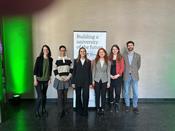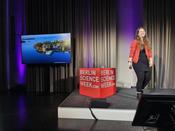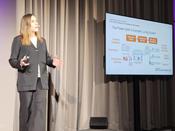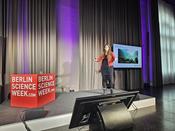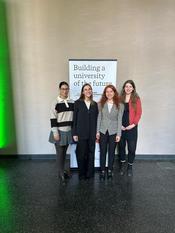Winners of the Una Europa PhD Impact Award present at Berlin Science Week
Nov 02, 2025
Four of the winners of this year's Una Europa PhD Impact Award presented their doctoral research projects at the Inspiration Stage of the Berlin Science Week on Saturday, 1 November 2025.
The PhD Impact Award aims to recognise and celebrate the impact, and potential impact, of research and researchers within Una Europa. It challenges doctoral researchers to articulate the impact of their research practices on society at large and their contribution to the world.
Meet the four winners and their research projects here:
Marina Lovichi-Acquaviva (Université Paris 1 Pantheón-Sorbonne): “Protecting animals through the environment: A One Health legal approach"
Marina's research asks how environmental law can renew and strengthen the legal status of animals. Current animal protection laws are fragmented, inconsistent, and often speciesist, while environmental law offers broader, systemic tools to protect life as a whole. By linking animals more closely to biodiversity and ecosystem protection, my approach aims to move beyond selective or discriminatory protection and recognise all animals as part of the living world that sustains us.
Marina said about her participation at the Inspiration Stage: "Presenting at Berlin Science Week is both an honour and an exciting opportunity. It means joining a global conversation, learning from other researchers, and contributing to new ways of thinking about the future."
Angelica Giovagnoli (Alma Mater Studiorum – Università di Bologna): “Smart materials, greener planet: cellulose can power next generation packaging”
The research projec tof Angelica focuses on the role of scientific research and how it can be crucial in revolutionising the fossil-based packaging industry by making it safe for the environment, the economy, and human health. How can innovation driven by science lead to sustainable alternatives that address the pressing global challenges related to packaging waste and pollution? To her, science communication is not just about disseminating knowledge, it's a vital tool for building trust between science and society. Communicating clearly and engagingly doesn’t mean oversimplifying; it means highlighting the value of research, shedding light on its processes, open questions, and societal relevance.
Angelica said about her application to the PhD Impact Award: "I decided to take part in the Una Europa PhD Impact Award because I deeply believe in the importance of sharing scientific research beyond academic circles. While science has a tangible impact on society and the planet, it often remains confined to laboratories or specialised publications. This initiative offered a valuable opportunity to explore how to make my research more engaging, accessible, and relevant to a broader audience."
Eva Karin Rohlfer (Helsingin yliopisto/Helsingfors universitet): “Carbon and the Coast: What the Baltic Seafloor Reveals”
Eva is interested in the question of how the Baltic seafloor stores and releases carbon? Why does it matter for the climate? Coastal seafloors are dynamic components of the global carbon cycle. In shallow regions such as the northern Baltic Sea, sediments, vegetation, and animals interact to store and release carbon, forming so-called “blue carbon” ecosystems. These systems can function as long-term sinks, but under certain conditions also become sources of carbon emissions.
This is what Eva told us about her approach to science communication: "Communication gives scientific results their real value: people can only care about what they know. Take my research, for example — why should people understand that we need to protect and manage coastal ecosystems sustainably if they don’t know about their key role in carbon cycling? That’s exactly what motivates me to tell my research story. "
Virginia Negri (Alma Mater Studiorum – Università di Bologna): “Smarter Electricity for a Greener, Safer Future”
Virginia is a PhD candidate in Electrical Engineering at the University of Bologna and her research has been focusing on AI-based distributed measurement architectures in electrical power systems. She decided to take part in the competition because she felt it offered such a wonderful chance to connect with other researchers, exchange ideas, and learn from their approaches, enriching both my scientific experience and human connections.
She describes her perspective on the Inspiration Stage presentation like this: "I’m really excited to be part of the Berlin Science Week. I’m looking forward to meeting people, sharing my ideas, and hearing their perspectives. Also, more personally, having the opportunity to be in Berlin for professional recognition, after having visited the city many times as a tourist, makes this experience even more special."

